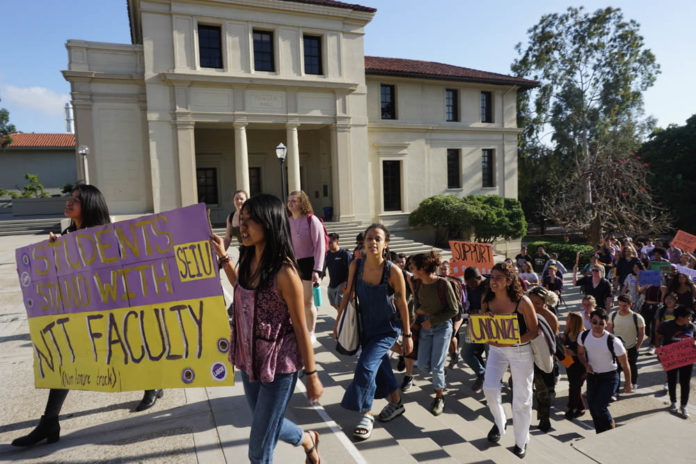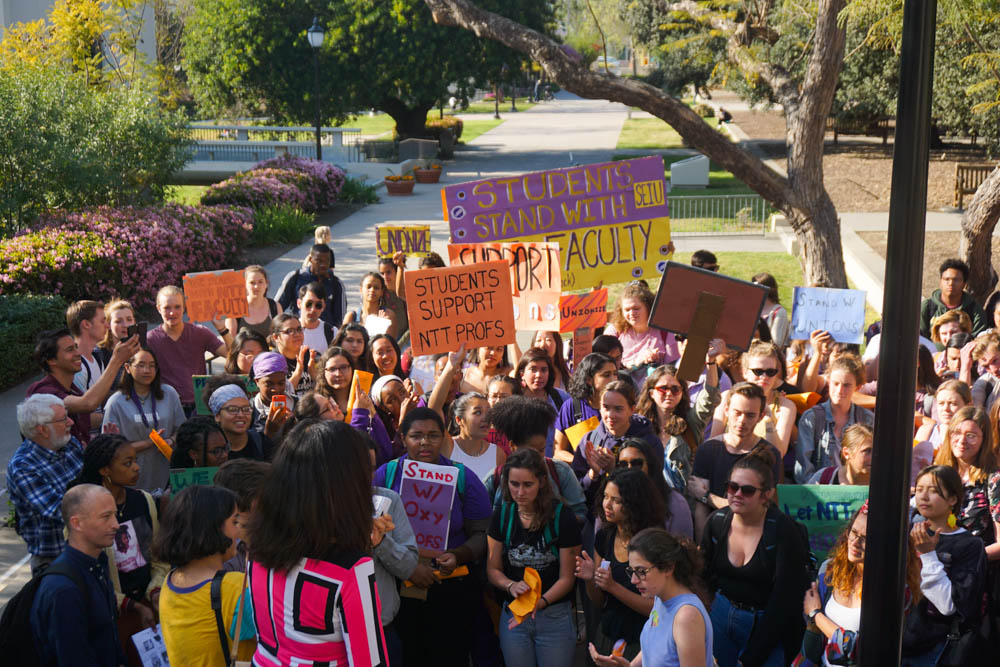
Non-tenure track (NTT) faculty delivered a letter April 2 addressed to President Jonathan Veitch, Vice President of Academic Affairs, Dean of the College Wendy Sternberg and the board of trustees requesting that Occidental stay neutral as NTT faculty pursue unionization through Service Employees International Union (SEIU) Local 721.
Dmitri Garcia, lead external organizer of SEIU Local 721, said the unionizing process began when NTT faculty at Occidental approached SEIU Local 721 about unionizing. After a certain number of NTT faculty signed cards indicating their intention to vote “yes” in the event of an election, NTT faculty filed for a union election with the National Labor Relations Board (NLRB) April 1. The election will likely occur sometime within the next few months, according to Garcia. If more than 50 percent of NTT faculty agree to unionize, they will gain the ability to collectively bargain for contract negotiations involving pay, health care benefits, course loads and job security.
The letter urged the Occidental administration to uphold the college’s values by remaining neutral.
“We ask that you honor our college’s mission statement with our tradition of social justice, fairness, equity and integrity, and respect our right to organize without interference from the Administration,” the letter said.

Around 100 students gathered April 2 in support of NTT faculty and their plans to attempt to unionize. In a march organized in collaboration with the Student Labor Alliance (SLA), students first convened in front of the library. Members of SLA and NTT faculty, including NTT assistant professor of English Spencer Jackson and NTT professor of education and director of the Community Literacy Center Désirée Zamorano, spoke in support of unionization.
“We want to be respected as the community builders, as the part of the team that we are,” Zamorano said. “And the best way we can do this is by collaborating, by organizing, by becoming part of the union.”
Students, many wearing purple, the color of SEIU Local 721, chanted, sang songs and held signs with phrases like, “We stand with NTT Faculty.” The group of students then walked to the Arthur G. Coons Administrative Center and accompanied Brian Clearwater, assistant professor of religious studies, as he delivered the letter on behalf of NTT faculty requesting that Occidental remain neutral during the upcoming election. Other faculty members attended the event and some watched from the side.
Occidental’s 43 full-time NTT faculty and 79 part-time NTT faculty constitute roughly one-third of the college’s professors but teach more than one-third of classes, according to NTT associate professor Laural Meade of the theater department.
Tenure-track professors teach five classes over a single school year, sit on committees, formally advise students, publish academic articles and conduct research, according to Meade. For NTT faculty, six classes is considered a full-time course load. Meade said they are not required to sit on committees, but their contracts vary in whether they are expected to perform other duties, such as advising students.
According to Occidental’s faculty handbook, promotions from assistant professor to associate professor to professor are awarded upon review from the Dean of the College for both tenure and non-tenure track positions.
Following the April 1 filing of an election request, the NRLB will host a hearing April 10, during which it will be determined if an election will occur. At that point, mail-in ballots will be sent to eligible NTT faculty at their home addresses, according to Meade. The union will form if more than half of those who participate in the election vote “yes.” If a union forms, the bargaining unit and Occidental will negotiate contract terms for NTT faculty.

According to a statement released by Director of Communications Jim Tranquada, Occidental is in the process of determining whether they will remain neutral toward the upcoming election.
“The College is reviewing the petition received from NTT faculty on Tuesday [April 2]. In the meantime, the required Notice of Petition for Election was posted on Thursday [April 4] via email to NTT faculty. Paper copies of the notice also were posted in academic buildings,” Tranquada said via email.
Professor Peter Dreier, E.P. Clapp Distinguished Professor of Politics and professor of Urban & Environmental Policy, believes the college should stay neutral.
“It would be a big mistake if the administration spent a dime hiring consultants to try to undermine the union organizing drive,” Dreier said. “But I don’t think they would do that.”
According to the National Labor Relations Act, employers cannot interfere with, restrain, or coerce employees in their efforts to unionize and collectively bargain. In a neutrality agreement, the employer agrees to remain neutral during unionization while, in return, unionizing employees agree not to picket, boycott or strike.
Clearwater is one of nine NTT professors who teach either five or 5.5 classes a year but are not considered full time, so they do not receive employment benefits like health care. As an NTT professor, Clearwater does not know whether his contract will be renewed year to year.
“There’s no stability or security, which takes a real toll over time of not having job security to be able to care for my family,” Clearwater said.
If a union is formed, the bargaining unit will also have the opportunity to negotiate contractual agreements about NTT faculty’s pay. Meade has worked at Occidental for 21 years. She will not be awarded tenure as part of the regular promotion process because, according to Meade, Occidental’s policy does not allow NTT faculty to be promoted to tenure status unless they apply for a position opened through a vacancy or the creation of a new tenured position. She said she is concerned about her pay.
“I’ve lived in my apartment in Hollywood for 25 years. And because it’s rent controlled, I can afford it on the salary that I make. If I lose my rent-controlled apartment, I either need to quit this job and find something that pays better, or I’m going to need to move at least an hour and a half, if not two hours away to find a place I can afford on the salary that I make,” Meade said.
Meade and other NTT faculty expressed that part of their frustration regarding their working conditions is due to their inability to provide the best teaching possible to their students.
“It all comes back to the students,” Meade said. “A teacher who knows that they’re going to be here and knows that they’re not going to be kicked from six classes to four classes, and then maybe no classes and then back up — that teacher can plan longer term projects, bond with students in different ways, hunker down on their own research and make better collaborations with fellow colleagues.”
Clearwater explained that he is also motivated by the students he teaches.
“I’m so impressed by our students and encouraged by their support,” Clearwater said. “I think so much of why we, especially as NTT faculty without benefits, do it is because we love our students.”
Independent of the efforts to unionize, Occidental’s NTT committee, made up of four NTT faculty and one tenured faculty member, conducted a survey of NTT faculty. The committee sent the results to NTT faculty by email Feb. 12. Out of 70 respondents, 45 percent said they agreed to some degree that their contributions to the college were valued and respected appropriately, while 49 percent expressed some level of disagreement. Forty-seven percent of NTT faculty surveyed expressed some level of disagreement with the statement, “I have faith in the hiring and contracting process.”
The committee has had difficulty finding statistics about NTT employment due to changes in course load and lack of data.
The NTT committee is responsible for advocating for NTT faculty but according to Meade, has no final power or standing in decisions.
“As a non-tenure track committee making formal policy recommendations to the administration and then advocating that those be enacted, we actually have no real codified power or standing to request or demand that those things be enacted. So we can ask all we want, but the college is actually no longer under no obligation to say ‘yes,” Meade said.
If NTT faculty unionize, they will gain the ability to collectively bargain for contractual agreements such as pay and consistency in contracts, according to multiple sources.
“One of the poor conditions of working as an adjunct is that we are isolated from each other. It’s hard to develop a sense of belonging or shared purpose, whereas T3 [tenured] faculty have faculty meetings and retreats and work on committees with each other,” Clearwater said via email.
A union would allow for NTT faculty to have a collective voice, according to Dreier.
“In some ways, the SEIU Union, for the adjunct, is a way of saying, ‘We’re part of the Oxy family and you need to treat us like family members,’” Dreier said. “But also, we’re workers, and we have certain rights, and the best way to get our rights implemented is to have a collective voice.”
Occidental’s NTT faculty’s plans to unionize follow the path of other colleges. NTT faculty at Otis College of Art and Design, Whittier College and others have recently unionized under SEIU.
According to Clearwater, he hopes the union will give him and his colleagues more power within Occidental.
“Part of what it means to me is that I have an advocate who is compensated and trained to do that work.” Clearwater said, “Especially one as big and powerful as SEIU.”
This article has been revised to clarify the number of NTT faculty, the number of classes NTT faculty teach, the process by which NTT can become tenured, and the origin of the unionization push.
![]()






























